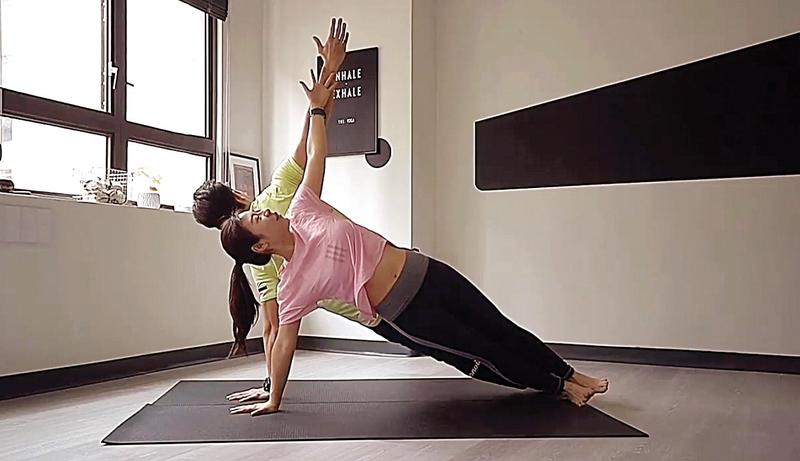Online fitness classes boom with gyms shuttered during lockdown — a trend some say is here to stay in the post-pandemic world. Kathy Zhang reports from Hong Kong.
 Ng wun-po, a fitness trainer and actor, works with his wife, a yoga instructor, in the video to show how couples work out at home. (PHOTO PROVIDED TO CHINA DAILY)
Ng wun-po, a fitness trainer and actor, works with his wife, a yoga instructor, in the video to show how couples work out at home. (PHOTO PROVIDED TO CHINA DAILY)
More than 1,000 gyms across Hong Kong were ordered to close for weeks because of the coronavirus, and as a result, online fitness classes have flourished.
Ng wun-po, a fitness instructor, has put all his efforts into producing videos to teach people how to keep fit at home using fitness equipment.
Ng works for different fitness centers. One of his employers, Bounce Limited, a studio that uses gymnastics trampoline for working out, announced it was closing permanently three days after the government ordered gyms and spas to close on March 28.
Ng records about three fitness-related videos every week and uploads them to Facebook and Instagram.
Ng believes that uploading videos is an opportunity to share useful home-workout knowledge amid the COVID-19 pandemic, and offers the industry a way out of its malaise.
In 2019, the city’s fitness industry was said to worth HK$2.8 billion (US$361 million), according to Fitness Guide, a Hong Kong-based community organization, which provides information about the city’s fitness industry.
The industry is one of the hardest-battered industries amid the pandemic. Some small fitness studios shut down; the city’s hundreds of thousands of full-time gym trainers have suffered a plunge in income for months.
Some laid-off gym trainers are working for delivery services, Terence Chau, CEO of Asian Academy for Sports and Fitness Professionals (AASFP), told China Daily.
To maintain the bonds with clients during weeks-long service suspension, many fitness centers and trainers like Ng have provided prerecorded video classes or taken online livestreaming sessions via Facebook, Zoom and Instagram for their workout-starved members.
Pure, one of the biggest fitness and yoga chains in Hong Kong, is one of them. On May 13, Pure launched Zoom livestream classes for its clients.
Livestream tutorial sessions give clients an opportunity to keep in touch with their trainers during the special time, even if clients stay in different countries because of the social distancing measures or border restrictions, Chau said.
Chau, also a physiotherapist and resistance and Pilates instructor, in recent months has been providing livestream tutorial classes to his students once or twice every week. Some of his students are in South Korea and Taiwan.
 Ng wun-po, a fitness trainer and actor, works with his wife, a yoga instructor, in the video to show how couples work out at home. (PHOTO PROVIDED TO CHINA DAILY)
Ng wun-po, a fitness trainer and actor, works with his wife, a yoga instructor, in the video to show how couples work out at home. (PHOTO PROVIDED TO CHINA DAILY)
Great demand
Ng found people’s demand for a good sweat, stretch and de-stress at home or in small spaces is growing as more people have to stay home longer amid closures of gyms and entertainment venues.
In tutorial videos, Ng concentrates on focused strength and stretching exercises. He also works with his wife, a yoga instructor, to show how couples can do home workouts together.
The AASFP now also provides an eight-hour online fitness training course for home workouts.
Fitness equipment for home use is in great demand amid gym closures.
According to Decathlon Hong Kong, a sporting goods retailer, resistance bands and dumbbells are popular in its offline and online stores. When China Daily searched through some home-use equipment in the Decathlon Hong Kong online store on April 15, two kinds of resistance bands and five kinds of dumbbells were shown to be out of stock.
A 27-year-old freelancer journalist surnamed Liu bought a yoga mat in April after her yoga class at a gym was suspended.
Liu downloaded a fitness app and followed some fitness influencers on social media. The young woman has more options on the internet, but she said she will return to the gym to have classes after the pandemic. She prefers to work out with an instructor telling her whether she is doing the exercises correctly.
“Different people will make different choices. Online fitness classes just provide us with more options,” Liu said.
Making a bigger cake
The coronavirus pandemic temporarily imposed a negative impact on the city’s fitness industry. Business may not recover quickly even though they were reopened after May 8, Chau believes.
“Some people still prefer to work out at home for fear of COVID-19 infection in the following months,” Chau said.
The global health challenge will be a boon for the industry in the future, Chau believes.
“People are aware of the importance of boosting their own immune systems and enhancing overall fitness by doing exercises. Therefore, more customers will enter the market, either online or offline.” he explained.
Chau disagreed that the boom of the online fitness industry will be a threat for the businesses of the offline world. “On the contrary, the boom makes the cake of the fitness industry bigger,” he said.
The development of the online fitness industry also provides gym trainers with more options.
Chau said the off season is a good opportunity for gym instructors to strengthen their own competitiveness by learning more exercise techniques.
Tourism and catering industries also have been seriously hit by the city’s months-long social unrest and the pandemic. According to the Tourism Board, the number of visitors to Hong Kong in the first quarter decreased by 80.9 percent from the same period last year.
The city’s joblessness has been surging. According to the Census and Statistics Department, Hong Kong’s jobless rate soared to 5.2 percent, the highest in more than 15 years, for the period from February through April.
Given that, Chau suggested laid-off young people take personal training courses and sit certification exams to prepare for the changing field and make themselves more marketable.
Contact the writer at kathyzhang@chinadailyhk.com


